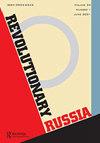Crisis and Pragmatism: The Evolution of the Soviet Procurement Apparatus in Civil War-era Penza, 1919–1920
IF 0.2
2区 历史学
Q2 HISTORY
引用次数: 0
Abstract
The twin challenges of grain procurement and military threat from the White armies in 1919 and 1920 and how they were handled by provincial soviet officials are essential to understanding the survival and nature of Soviet Russia. The purpose of this article is to use a local study to examine in detail how the 1919-20 Soviet procurement campaigns were conducted in the localities. The focus here is Penza, a central ‘producing' province, located on the eastern edge of the central Black Earth region yet at a distance from the Volga and outlying provinces where ferocity, loyalty to the revolution, and personal power prevailed in procurement and government control was weak. The Bolsheviks routinely concentrated armed force and capable personnel in one crisis area after another for short-term military or procurement purposes. Yet, this study finds that for Penza resources such as armed food brigades and rank-and-file communists became scarce as these were mobilized for work in newly occupied regions where procurement burdens became more significant. Procurement officials in Penza faced the necessity of near constant pragmatic adjustments in their engagement with their subordinates as well as peasant producers as circumstances and access to resources changed frequently. By tracing the local apparatus's history, a clearer picture emerges of the obstacles and adjustments involved in administering the Soviet grain monopoly behind the lines of the Civil War. In this way, we add to our knowledge of the challenges that shaped the Bolsheviks' efforts to resolve the grain crisis and survive the Civil War.危机与实用主义:1919-1920年内战时期奔萨半岛苏联采购机构的演变
1919年和1920年来自白军的粮食采购和军事威胁这两个双重挑战,以及苏联省级官员如何处理这些挑战,对于理解苏俄的生存和性质至关重要。本文的目的是利用一项当地研究来详细研究1919-20年苏联的采购活动是如何在当地进行的。这里的重点是奔萨省,一个中部“生产”省,位于中部黑土区的东部边缘,但与伏尔加省和边远省份相距甚远,在那里,凶猛、对革命的忠诚和个人权力在采购中占主导地位,政府控制薄弱。布尔什维克经常将武装力量和有能力的人员集中在一个又一个危机地区,用于短期军事或采购目的。然而,这项研究发现,对于奔萨来说,武装食品旅和普通共产主义者等资源变得稀缺,因为这些资源被动员到新占领的地区工作,那里的采购负担变得更加沉重。奔萨的采购官员在与下属以及农民生产者的接触中面临着几乎不断进行务实调整的必要性,因为环境和获取资源的途径经常发生变化。通过追溯当地机构的历史,可以更清楚地了解内战后管理苏联粮食垄断所涉及的障碍和调整。通过这种方式,我们进一步了解了布尔什维克为解决粮食危机和在内战中幸存所面临的挑战。
本文章由计算机程序翻译,如有差异,请以英文原文为准。
求助全文
约1分钟内获得全文
求助全文

 求助内容:
求助内容: 应助结果提醒方式:
应助结果提醒方式:


